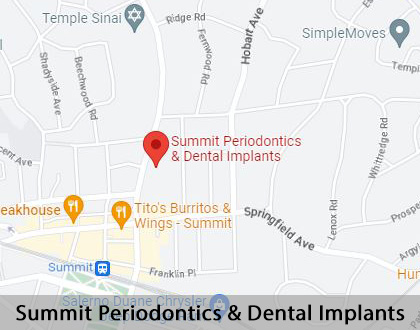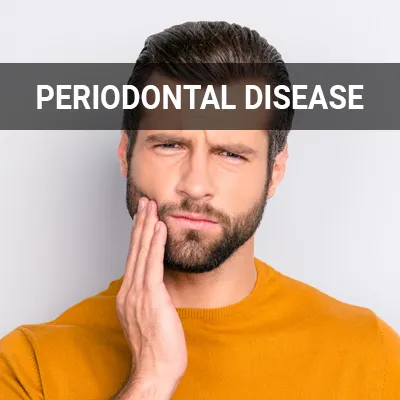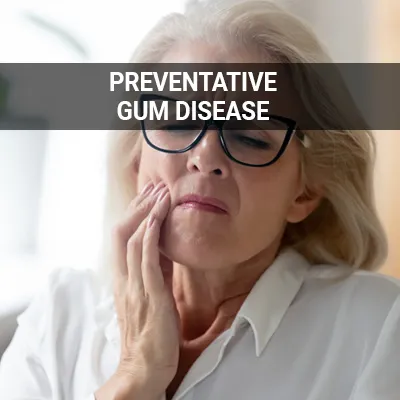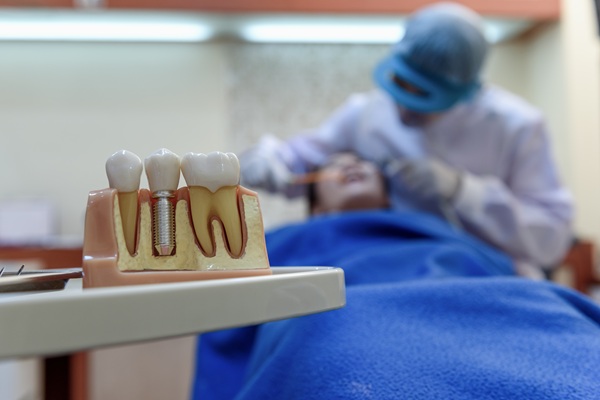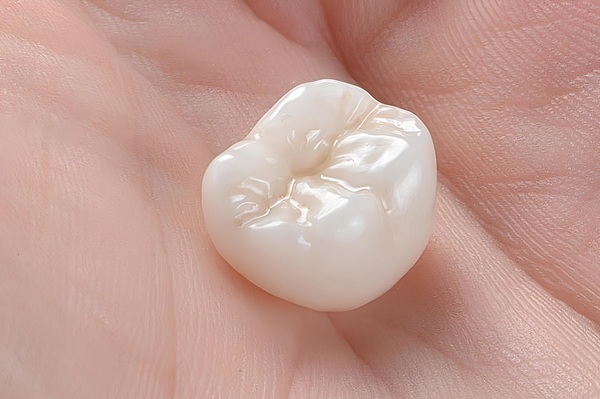Conditions Linked to Gum Health Summit, NJ
Many systemic conditions are linked to gum health. Oral health is often indicative of one's overall health. Therefore, keeping the gums healthy is a vital part of keeping the body healthy. A periodontist can help you maintain your gum health.
Gum health care is available at Summit Periodontics & Dental Implants in Summit and the surrounding area. Do not neglect this crucial part of your health. Call us today at (908) 219-6664 to schedule an appointment or learn more about our services.
The Oral-Systemic Link
According to the Mayo Clinic, "problems in your mouth can affect the rest of your body." While the mouth teems with mostly harmless bacteria, some of these bacteria can cause disease. This is especially critical since the mouth acts as the entryway to the digestive and respiratory tracts. Good oral hygiene and the body's natural responses are normally enough to keep the bacteria under control. However, if someone has insufficient oral hygiene, bacteria may reach levels that can lead to various oral infections.
Additionally, certain medications may reduce saliva flow. Saliva is crucial because it washes away food and neutralizes acids produced by bacteria in the mouth. This can help protect the patient from microbes that multiply and lead to disease. Studies also suggest that oral bacteria and periodontitis-related inflammation may play a role in certain diseases.
“…if someone has insufficient oral hygiene, bacteria may reach levels that may lead to various oral infections.”
Conditions Linked to Gum Health
Gum disease has been linked to several health conditions. These include Alzheimer's, asthma, cancer, diabetes, heart and kidney disease, and osteoporosis. There are over 120 conditions that have been associated with various dental problems. Currently, the strongest known connections are between gum disease and diabetes and gum disease and the heart.
With gum disease, plaque is left behind in the gum tissue, inducing a greater inflammatory response and making it more difficult for patients to control their blood sugar. As such, it should come as no surprise that, in a 2017 study, nearly 1 in 5 people with periodontitis had type 2 diabetes without knowing it. Bacteria in infected gum tissue can also enter the bloodstream and travel to other parts of the circulatory system, thus causing inflammation and arterial plaque. Consequently, there is strong evidence suggesting that systemic inflammation caused by oral bacteria may factor into the development of atherosclerosis.
“There are over 120 conditions that have been associated with various dental problems.”
Health Conditions That Affect the Gums
Certain conditions may also affect a patient's oral health, such as diabetes, HIV/AIDS, osteoporosis, and Alzheimer's disease. Eating disorders, rheumatoid arthritis, certain cancers, and Sjorgen's syndrome (an immune system disorder that causes dry mouth) may also influence gum health. Diabetes puts the gums at risk because it reduces the body's resistance to infection. As such, gum disease appears more frequently and more severely among people with diabetes. There is also a correlation between HIV/AIDS and painful mucosal lesions. Additionally, osteoporosis is linked with periodontal bone loss and tooth loss.
Since so many health conditions are linked to gum health, it is imperative for patients to notify their periodontist about any preexisting conditions they may have. Oftentimes, treating one's periodontal health effectively treats the patient's other health conditions and vice versa. For example, research has found that regular periodontal care may improve diabetes control.
“Certain conditions may also affect a patient’s oral health, such as diabetes, HIV/AIDS, osteoporosis, and Alzheimer’s disease.”
Check out what others are saying about our dental services on Yelp: Conditions Linked to Gum Health in Summit, NJ
Possible Complications of Unhealthy Gums
It is crucial to treat unhealthy gums as soon as possible. Periodontitis, if left untreated, can lead to the total destruction of the supporting structures of the teeth, including the jawbones. Teeth may also loosen and fall out or require extraction.
Other potential complications of periodontitis include painful abscesses, teeth migration, receding gums, and exposure of the tooth roots. Periodontal disease may complicate pregnancy, cause an increased risk of heart disease, respiratory disease, and diabetes. Unhealthy gums may also lead to cavities, cracked and broken teeth, and oral cancers.
“It is crucial to treat unhealthy gums as soon as possible.”
Questions Answered on This Page
Q. What is the oral-systemic link?
Q. What are some conditions linked to gum health?
Q. What health conditions affect the gums?
Q. What are some possible complications of unhealthy gums?
Q. What can a periodontist do for gum health?
People Also Ask
Q. What are the common causes of periodontal disease?
Q. What are the symptoms of gum disease?
Q. What can I do to prevent gum disease?
Q. What are common therapeutic treatments for gum disease?
How a Periodontist Treats the Gums
According to WebMD, a periodontist is a dental specialist who prevents, diagnoses, and treats gum disease. They may also help patients manage signs of advancing gum problems, such as oral inflammation. The early form of gum disease is called gingivitis, and it can be reversed with proper oral hygiene. However, it takes a periodontist to treat more advanced gum disease (known as periodontitis). A periodontist will review one's dental and medical histories and conduct a dental exam to come up with the best treatment options.
Nonsurgical periodontal treatments include scaling and root planing, where the periodontist removes plaque and tartar from deep under the gumline. Depending on the case, a periodontist may pair these procedures with antimicrobial or antibiotic medicines. For more severe cases of gum disease, surgical measures may be necessary. In such cases, a periodontist can perform a gum graft to cover the receded gum line. This can effectively stop tooth decay, reduce sensitivity and pain, and enhance one's smile. Other periodontal surgical procedures include laser treatments, regenerative procedures, dental crown lengthening, dental implants, and periodontal pocket reduction procedures (or osseous surgery).
“According to WebMD, a periodontist is a dental specialist who prevents, diagnoses, and treats gum disease.”
Frequently Asked Questions
Q. Do I really need to floss for my gum health?
A. Flossing is essential for oral health. Doing so clears food and plaque from between the teeth and under the gumline. Otherwise, plaque hardens into tartar, forming wedges and widening the space between the teeth and the gums.
Q. What are the stages of gum disease?
A. There are three main stages of gum disease: gingivitis, periodontitis, and advanced periodontitis. Gum disease becomes harder to treat the more it advances. As such, it is imperative to seek professional treatment as soon as possible.
Q. Is gum disease reversible?
A. Only gingivitis can be reversed. By following a periodontist's instructions and sticking to a proper oral hygiene routine, it is possible to restore the health of your gums. If left untreated, however, the gums become irreversibly damaged.
Q. Is gum disease preventable?
A. Yes. The number one way to prevent gum disease is by practicing proper oral hygiene. Brush at least twice nightly, floss nightly, and keep regular dental visits.
Q. What are the different types of periodontitis?
A. There are four main types of periodontitis: chronic periodontitis, aggressive periodontitis, periodontitis as a manifestation of systemic disease, and necrotizing periodontal disease. Periodontitis is a broad term encompassing damage done to gums and periodontal tissue. Periodontitis will not go away on its own, so it is important to see a periodontist as soon as possible.
Start Feeling Better – Visit Us Today
By visiting us as soon as possible, our team can help get you the professional treatment you need. Instead of waiting around and allowing the symptoms to get worse, we can provide you with treatment options.
Definitions
Call Us Today
The health of your mouth and body are linked. Taking care of your mouth is an important part of caring for your overall health. We at Summit Periodontics & Dental Implants can help. Call us today at (908) 219-6664 to schedule an appointment or learn more about our services.
Helpful Related Links
- American Academy of Periodontology (AAP). American Academy of Periodontology (AAP). 2023
- Center for Disease Control and Prevention (CDC), Periodontal Disease Page. Center for Disease Control and Prevention (CDC), Periodontal Disease Page. 2023
- WebMD, What Is a Periodontist?. WebMD, What Is a Periodontist?. 2023
About our business and website security
- Summit Periodontics & Dental Implants was established in 2015.
- We accept the following payment methods: American Express, Cash, Check, Discover, MasterCard, and Visa
- We serve patients from the following counties: Union County, Morris County and Essex County
- We serve patients from the following cities: Summit, Chatham, New Providence, Springfield Township, Maplewood, Berkeley Heights, Madison, Westfield, Millburn and Short Hills
- Norton Safe Web. View Details
- Trend Micro Site Safety Center. View Details
Back to top of Conditions Linked to Gum Health

